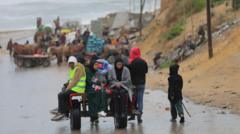The Israeli Defence Minister, Israel Katz, has signaled a significant escalation in the conflict with Hamas, threatening military action to seize additional areas in Gaza if all remaining hostages are not freed. This action follows the reopening of military operations after a recent ceasefire, resulting in heightened violence and casualties.
Israel's Defence Minister Declares Plan to Seize More Territory in Gaza

Israel's Defence Minister Declares Plan to Seize More Territory in Gaza
Israel's ongoing military action intensifies as Defence Minister Katz issues stark warnings against Hamas over hostage situation.
As tensions soar, Katz has ordered the military to intensify ground operations in Gaza, aiming for the unconditional return of hostages—both living and deceased. He expressed that the more Hamas refuses to cooperate, the more territory Israel will seize. While Israel shows willingness to consider a US-brokered proposal by envoy Steve Witkoff for phased hostage releases alongside ceasefire breaks, fighting continues unabated.
Katz announced plans to escalate military strikes across air, sea, and land, stating, “We will not relent until Hamas is defeated.” Notably, he referenced US President Trump's controversial intentions for Gaza, which seek to address the region's complex issues by proposing transfer plans for its population—an idea rejected by both Palestinian factions and criticized as a potential violation of international laws against forced civilian displacement.
Following the breakdown of the recent ceasefire, initiated in January, Israeli airstrikes have left more than 430 people dead in just two days according to health officials in Gaza,with Hamas firing retaliatory rockets toward Tel Aviv. Amidst these hostilities, government spokespeople blame Hamas for the failure to secure a hostage agreement, while Hamas maintains that it is engaged in negotiations aimed at achieving a mutually beneficial resolution.
The humanitarian crisis continues to escalate, with ongoing military operations and mass casualties reported since the conflict's resurgence in October 2023, when around 1,200 people were killed during an unprecedented cross-border attack. The destruction in Gaza has led to widespread displacement and loss, with ongoing operations by the Israeli military aiming to dismantle Hamas infrastructure.
As the situation develops, civilians in targeted areas face evacuation orders, contributing to a climate of fear and instability within an already vulnerable population. The international community continues to watch closely as the conflict brings escalation and uncertainty to the already complex dynamics of the region.
Katz announced plans to escalate military strikes across air, sea, and land, stating, “We will not relent until Hamas is defeated.” Notably, he referenced US President Trump's controversial intentions for Gaza, which seek to address the region's complex issues by proposing transfer plans for its population—an idea rejected by both Palestinian factions and criticized as a potential violation of international laws against forced civilian displacement.
Following the breakdown of the recent ceasefire, initiated in January, Israeli airstrikes have left more than 430 people dead in just two days according to health officials in Gaza,with Hamas firing retaliatory rockets toward Tel Aviv. Amidst these hostilities, government spokespeople blame Hamas for the failure to secure a hostage agreement, while Hamas maintains that it is engaged in negotiations aimed at achieving a mutually beneficial resolution.
The humanitarian crisis continues to escalate, with ongoing military operations and mass casualties reported since the conflict's resurgence in October 2023, when around 1,200 people were killed during an unprecedented cross-border attack. The destruction in Gaza has led to widespread displacement and loss, with ongoing operations by the Israeli military aiming to dismantle Hamas infrastructure.
As the situation develops, civilians in targeted areas face evacuation orders, contributing to a climate of fear and instability within an already vulnerable population. The international community continues to watch closely as the conflict brings escalation and uncertainty to the already complex dynamics of the region.





















